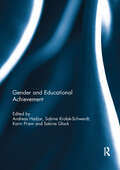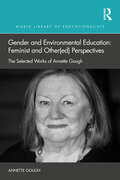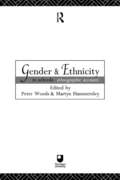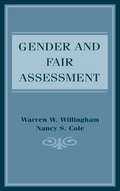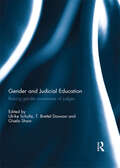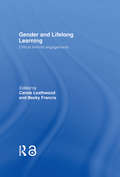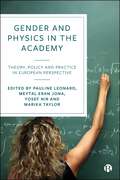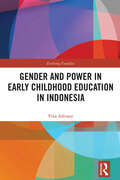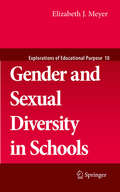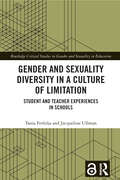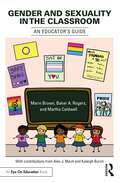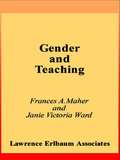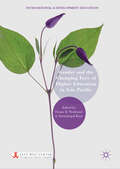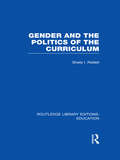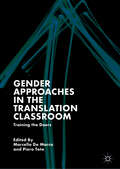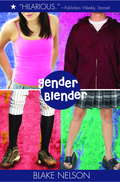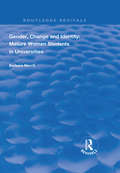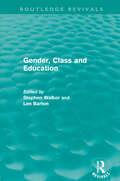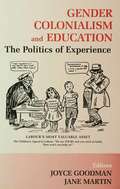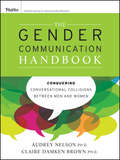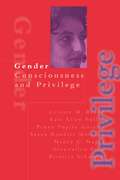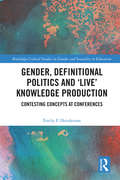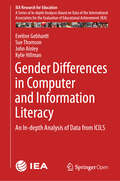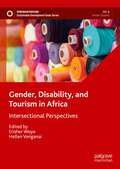- Table View
- List View
Gender and Educational Achievement
by Andreas Hadjar, Sabine Krolak-Schwerdt, Karin Priem and Sabine GlockGender inequalities in education – in terms of systematic variations in access to educational institutions, in competencies, school marks, and educational certificates along the axis of gender – have tremendously changed over the course of the 20th century. Although this does not apply to all stages and areas of the educational career, it is particularly obvious looking at upper secondary education. Before the major boost of educational expansion in the 1960s, women’s participation in upper secondary general education, and their chances to successfully finish this educational pathway, have been lower than men’s. However, towards the end of the 20th century, women were outperforming men in many European countries and beyond. The international contributions to this book attempt to shed light on the mechanisms behind gender inequalities and the changes made to reduce this inequality. Topics explored by the contributors include gender in science education in the UK; women’s education in Luxembourg in the 19th and 20th century; the ‘gender gap’ debates and their rhetoric in the UK and Finland; sociological perspectives on the gender-equality discourse in Finland; changing gender differences in West Germany in the 20th century; the interplay of subjective well-being and educational attainment in Switzerland; and a psychological perspective on gender identities, gender-related perceptions, students’ motivation, intelligence, personality, and the interaction between student and teacher gender. This book was originally published as a special issue of Educational Research.
Gender and Environmental Education: The Selected Works of Annette Gough (World Library of Educationalists)
by Annette GoughThis timely book provides a starting point for critical analysis and discourse about the status of gendered perspectives in environmental education research.Through bringing together selected writings of Annette Gough, it documents the evolving discussions of gender in environmental education research since the mid-1990s, from its origins in putting women on the agenda through to women’s relationships with nature and ecofeminism, as well as writings that engage with queer theory, intersectionality, assemblages, new materialisms, posthumanism and the more-than-human. The book is both a collection of Annette Gough, and her collaborators, writings around these themes and her reflections on the transitions that have occurred in the field of environmental education related to gender since the late 1980s, as well as her deliberations on future directions.An important new addition to the World Library of Educationalists, this book foregrounds women, their environmental perspectives, and feminist and other gendered research, which have been marginalised for too long in environmental education.
Gender and Ethnicity in Schools: Ethnographic Accounts (Open University Reader - Course E812 Ser.)
by Martyn Hammersley Peter WoodsA serious but highly accessible look at recent work on the issues of gender and race. Gender and Ethnicity in Schools raises crucial educational and political issues, paying particular attention to the pupils' experience of school.
Gender and Fair Assessment
by Warren W. Willingham Nancy S. ColeThere have been many important changes in the participation of women and men in American society over the past quarter-century. Tests play a role in those changes by providing evidence of the diverse achievement and proficiency of women and men. They aid the learning process and reflect inequalities in opportunity to learn and participate. In addition, they provide useful information in considering what alternatives in education and work make most sense for individuals and influence views about groups of students, educational programs, and a wide range of issues. For all of these reasons, it is important that tests assess fairly and reflect accurately the ways young people are and are not achieving as well as desired. The test performance of women and men is a research topic of historical interest and has received much attention in recent years. Because of this increased interest, there is a great deal of new research and data available. The purpose of the study presented in this volume was to review this new information with two objectives in mind: *to clarify patterns of gender difference and similarity in test performance and related achievements, and *to see what implications those findings might have for fair assessment and, as a corollary, examine the assessment process as a possible source of gender differences. This study is interested in tests used in education to assess developed knowledge and skill. In order to gain a broader view of gender similarity and difference, the contributors looked at other types of measures and other characteristics of young women and men. Their hope is to contribute to a firmer basis for insuring fairness in tests--an objective which is particularly important as the field moves increasingly to new forms of assessment in which there is less experience.
Gender and Judicial Education: Raising Gender Awareness of Judges
by Ulrike Schultz, T. Brettel Dawson and Gisela ShawJudicial Education has greatly expanded in common law countries in the past 25 years. More recently it has become a core component in judicial reform programs in developing countries with gender attentiveness as an element required by donor agencies. In civil law jurisdictions judges´ schools have long played a role in the formation of the career judiciary with a focus on entry to the judicial profession, in some countries judges get an intensive in-service education at judicial academies. Gender questions, however, tend to be neglected in the curricula.These judicial education activities have generated a significant body of material and experience which it is timely to review and disseminate. Questions such as the following require answers. What is the current state of affairs? How is judicial education implemented in developed and developing countries all around the world? Who are the educators? Who is being educated? How is judicial education on gender regarded by judges? How effective are these programs?The chapters in this book deal with these questions. They provide a multiplicity of perspectives. Six countries are represented, of these four are civil law countries (Germany, Argentina, Japan, Bosnia and Herzegovina) and two are common law countries (Canada; Uganda). This book was previously published as a special issue of International Journal of the Legal Profession.
Gender and Lifelong Learning: Critical Feminist Engagements
by Carole Leathwood Becky FrancisThis insightful book is ideal for students, researchers and policy makers wanting a sound overview of the critical issues of gender in lifelong learning. Asking pertinent questions relating to discourses on policy, the authors offer the reader a rare view of lifelong learning from a gender-focused perspective, filling a gap in the literature and moving current debate on into new areas. Questions addressed include: To what extent can the policy discourses and institutional contexts of lifelong learning be seen as masculinised and/or feminised? What are the gender implications of lifelong learning policy? In what ways are learners’ identities constructed through lifelong learning? Does lifelong learning provide opportunities to challenge or transgress gender binaries? What are the implications for practice?
Gender and Physical Education: Contemporary Issues and Future Directions
by Dawn PenneyGender and Physical Education offers a critical and comprehensive commentary on issues relating to gender in PE and teacher education. The book challenges our understandings of gender, equity and identity in PE, establishing a conceptual and historical foundation for the issue, as well as presenting a wealth of original research material. The book delivers a critical analysis of the progress and shortcomings pf contemporary policies and practice in PE as they relate to gender, and reflects on the similarities and differences between developments in the UK, US and Australia. It also offers a new framework for research, policy and practice with a view to advancing gender equity, and addresses the roles that teachers, educators and policy makers can play in challenging existing inequalities. Gender and Physical Education is important reading for students and lecturers in education, teacher educators and providers of continuing professional development in PE, and anybody concerned with gender issues in education, PE or sport.
Gender and Physics in the Academy: Theory, Policy and Practice in European Perspective
by Pauline Leonard, Meytal Eran Jona, Yosef Nir, and Marika TaylorThis innovative interdisciplinary collection confronts the worldwide challenge of women's under-representation in science through an interrogation of the field of physics and its gender imbalance. Leading physicists and sociologists from across Europe collaborate to adopt a comparative approach. They draw on theoretical perspectives and empirical evidence to explore the reasons behind low participation levels, from entering the field to sustaining a career, emphasising the importance of social perspectives over biological explanations. Evaluating policy solutions implemented in various European contexts, this book offers key insights into the world of women physicists and sheds light on their life stories.
Gender and Power in Early Childhood Education in Indonesia (Evolving Families)
by Vina AdrianyAdriany explores gender discourses in early childhood education in Indonesia, as well as how teachers and children are engaged in the process of constructing, negotiating, and resisting dominant gender discourses in kindergartens.Using an ethnographic approach, Adriany explores how both the teachers and children are doing and undoing their gender. She adopts feminist poststructuralist and postcolonial theories through her research and, in that context, views gender as something fluid and unfixed. The book also investigates the methodological aspect where the authors have both an inside and outside perspective. Each chapter aims to present and complicate the taken-for-granted practices in kindergartens that relate to how gender and power are constructed. The findings of this book show the extent to which early childhood education becomes a space for the teachers and children to construct, negotiate, as well as resist dominant gender discourses in kindergartens.Offering insights into local and global contexts that shape gender values in early years, this book will be a valuable reference for researchers, scholars, and students in early childhood education, gender studies, and comparative education.
Gender and Sexual Diversity in Schools
by Elizabeth J. MeyerIssues related to gender and sexual diversity in schools can generate a lot of controversy, with many educators and youth advocates under-prepared to address these topics in their school communities. This text offers an easy-to-read introduction to the subject, providing readers with definitions and research evidence, as well as the historical context for understanding the roots of bias in schools related to sex, gender, and sexuality. Additionally, the book offers tangible resources and advice on how to create more equitable learning environments. Topics such as working with same-sex parented families in elementary schools; integrating gender and sexual diversity topics into the curriculum; addressing homophobic bullying and sexual harassment; advising gay-straight alliances; and supporting a transgender or gender non-conforming student are addressed. The suggestions offered by this book are based on recent research evidence and legal decisions to help educators handle the various situations professionally and from an ethical and legally defensible perspective.
Gender and Sexuality Diversity in a Culture of Limitation: Student and Teacher Experiences in Schools (Routledge Critical Studies in Gender and Sexuality in Education)
by Jacqueline Ullman Tania FerfoljaGender and Sexuality Diversity in a Culture of Limitation provides an outstanding and insightful critique of the ways that contemporary education is impacted by a range of political, social and cultural influences that inform the approaches that schools take in relation to gender and sexuality diversity. By applying feminist poststructural and Foucauldian frameworks, the book examines the ongoing impact of broader socio-cultural discourse on the lives of gender and sexuality diverse students and teachers. Beginning with an overview of the impact of how a culture of limitation is realised in Australia, the focus moves beyond this context to examine state and federal policies from comparable societies in countries including the USA and the UK and their effect on the production of knowledges and what’s permissible to include in educational curriculum. This research-driven book thus provides a comparative, international overview of the current state of gender and sexuality diversity in schools, and convincingly demonstrates that despite some empowerment of gender and sexuality diverse individuals, silencing and marginalization remain powerful forces. This book will be of great interest to graduate and postgraduate students, academics, professionals, and policy makers interested in the field of gender and sexuality in education. It is essential reading for those involved in pre-service and in-service teacher education, diversity education, the sociology of education, as well as education more generally.
Gender and Sexuality in the Classroom: An Educator's Guide
by Marni Brown Baker A. Rogers Martha CaldwellCreate a more gender-inclusive climate in your classroom and school. This important book breaks down issues of gender and sexuality at the individual, interactional, and institutional level and shows how you can cultivate an atmosphere of acceptance and belonging for all students. You’ll learn key concepts and terms educators need to know to support students, how gender and sexuality identities develop and influence mental health, why we should take an intersectional approach with students, and the importance of creating psychological safety in the classroom. You’ll also gain practical suggestions on how to disrupt unconscious bias, represent diverse voices, counteract microaggressions, use gender-neutral language and preferred pronouns, address gender bullying, provide safe zones, and craft inclusive school statements. Each chapter contains examples, anecdotes from teachers and students, best practices, and resources to help you along the way. Appropriate for educators of all grade levels, this book’s clear, helpful advice will help you ensure that your students feel visible, affirmed, and safe, so they can thrive in school and beyond.
Gender and Teaching
by Frances A. Maher Janie Victoria WardGender and Teaching provides a vivid, focused, and interactive overview of the important gender issues in education today. This is accomplished through conversations among experts, practitioners, and readers that are informed by representative case studies and by a range of theoretical approaches to the issues. Gender and Teaching is the third volume in the "Reflective Teaching and the Social Conditions of Schooling" series edited by Daniel P. Liston and Kenneth M. Zeichner. It follows the same format as previous volumes in the series. Part I includes four cases dealing with related aspects of gendered experiences in schools (nonsexist elementary school curricula, gender and race implications of special education assignment practices, homophobia in high schools and classrooms, and teaching as a woman's profession), followed by a set of teachers', administrators', and professors' reactions to each case. Part II is an elaboration of four "public arguments"--conservative, liberal, women-centered, and radical multicultural--pertaining to the issues raised in the cases in Part I. These arguments exemplify clusters of orientations, organized around general values rather than hard and fast principles. Part III presents the authors' own interpretations of the issues raised throughout the work and provides activities and topics for reflection and an annotated bibliography of additional resources. Content and Pedagogical Features: *Readers are encouraged throughout to interact with the text. They can respond to each case and compare their responses to those of others in the field. *The cases and discussions that follow help students begin to evolve their own "practical theories"; explore and perhaps modify some of their basic beliefs and assumptions; become acquainted with other points of view; and look further into the connections and intersections of gender with other structural dynamics and practices--those of race, class, and culture--as intrinsic to their explorations into the social conditions of schooling. *The major strands in feminist theory about women and education are presented so that students can analyze the differences among them, come up with positions of their own, and learn to defend them. *Although the authors draw on historical and sociological frameworks that show how women have historically been discriminated against in our schools and in our society, their goal is an education that is equally fair to everyone, boys as well as girls. Gender and Teaching is pertinent for all prospective and practicing teachers at any stage of their training. It can be used in any undergraduate or graduate course that addresses issues of gender and teaching.
Gender and the Changing Face of Higher Education in Asia Pacific (International and Development Education)
by Deane E. Neubauer Surinderpal KaurThis book establishes gender issues as a major focus within developments shaping higher education in the Asia Pacific region. The discussion is framed as a response to various dedicated efforts, such as that of the United Nations, to foreground gender as a site for political discourse throughout the region. Throughout the volume, authors confront issues that continue to gain prominence in higher education as a policy arena, including the degree to which higher education operates within a framework of gender equity and how higher education appointments—even promotions—are sensitive to gender. By touching specific instances throughout Korea, Japan, China, Australia, India, Malaysia, Thailand, and Taiwan, authors offer an unprecedented big-picture view of gender-relevant policy issues.
Gender and the Politics of the Curriculum (Routledge Library Editions: Education)
by Sheila RiddellThis book uses detailed case studies of two secondary schools to examine the relationship between curriculum choice and gender identity among fourteen-year-old pupils making their first choices about what subjects to pursue at exam level. It reveals a two way process. Pupils’ decisions on what subject to take are influenced by how they perceive themselves in gender terms, and the curriculum once chosen reinforces their sense of gender divisions. The author looks at the influences on pupils at this stage in their lives from peers, family and the labour market as well as from teachers. She argues that the belief in freedom of choice and school neutrality espoused by many teachers can become an important factor in the reproduction of gender divisions, and that unless the introduction of the national curriculum is accompanied by systematic efforts to eradicate sexism from the hidden curriculum it will fail in its aim of creating greater equality of educational opportunity among the sexes.
Gender Approaches in the Translation Classroom: Training the Doers
by Marcella De Marco Piero TotoThis volume examines strategies for embedding gender awareness within translation studies and translator training programmes. Drawing on a rich collection of theoretically-informed case studies, its authors provide practical advice and examples on implementing gender-inclusive approaches and language strategies in the classroom. It focuses on topics including, how to develop gender-inclusive practices to challenge students’ attitudes and behaviours; whether there are institutional constraints that prevent trainers from implementing non-heteronormative practices in their teaching; and how gender awareness can become an everyday mode of expression. Positioned at the lively interface of gender and translation studies, this work will be of interest to practitioners and scholars from across the fields of linguistics, education, sociology and cultural studies.
Gender Blender
by Blake NelsonEmma: Wants Jeff Matthews to notice her. Hates sexist boys. Wonders when she'll get her period. Tom: Must avoid looking like a wuss. Must deal with his blended family. Must get a chance with Kelly A. Then something freaky happens: Emma and Tom switch bodies. And until they can find a remedy: Emma: Can't believe she has a . . . thingie. Hates mean girls. Finds out secondhand that her period has arrived. Tom: Must learn to put on a bra. Must deal with an overachieving family. Must not be alone with Jeff Matthews. From the Hardcover edition.
Gender, Change and Identity: Mature Women Students in Universities (Routledge Revivals)
by Barbara MerrillFirst published in 1999, this volume centres on a case study which looks at the experiences of non-traditional adult women students in universities, from the perspective of the actors. The interaction of structure and agency and the significance of macro and micro levels in shaping the behaviour, attitudes and experiences of women adult students are examined by drawing on three perspectives: feminism, Marxism and interactionism. An underlying question is to what extent did studying change the way participants perceived themselves as women? It relates life histories to their student career as individuals and collectively as subcultural groups. It also breaks new ground by including a sample of male adult students in order to compare and clarify gender issues. It also uses macro and micro sociological theories as a tool for understanding the experiences of women at university and the relationship between their public and private lives. The book concludes that studying for a degree represented an active decision to take greater control, to break free from gender and class restraints, and to transform individual lives. The study aims to clarify and reassert the radical individual traditions within sociology, feminism and adult education.
Gender, Class and Education (Routledge Revivals)
by Stephen Walker Len BartonFirst published in 1983, Gender, Class and Education is a collection of papers that formed presentations at the Westhill Sociology of Education Conference in January 1982, and is the fifth such collection to emerge from the annual conference. The conference theme, ‘Race, Class and Gender’, was not only chosen because of its topicality, but also to provide a framework for debate between educational researchers and teachers. The papers focus on the reproduction of gender relations through education and provide important insights into how this process works, how it is resisted in schools and colleges, and the possibilities for radical intervention. This volume includes three teaching bibliographies on gender and education which were not presented at the conference, but were compiled specially for the book.
Gender, Colonialism and Education: An International Perspective (Woburn Education Series)
by Jane Martin Joyce GoodmanAn examination of the ways in which gender intersects with informal and formal education in England, Germany, Indonesia, South Africa, USA and the Netherlands. The book looks at various issues including: citizenship; authority; colonialism and education; and the construction of national identities.
The Gender Communication Handbook
by Audrey Nelson Claire Damken BrownMen and women exhibit distinct, innate, and acculturated sex differences in their verbal and nonverbal communication styles. In the work environment, the difficulties and misunderstandings generated by these differences not only reduce productivity and efficiency but also lower morale. In this book, the authors show through empirical research and extensive anecdotal evidence--garnered from fifty years of combined corporate work experience, research, gender seminars, coaching and consulting--the specific verbal and nonverbal behaviors men and women employ that define our sex roles' expectations yet paradoxically often ultimately result in barriers to effective inter-gender communication.
Gender Consciousness and Privilege
by Celeste Brody Kasi Allen Fuller Penny Poplin Gosetti Susan Randles Moscato Nancy Gail Nagel Glennellen Pace Patricia SchmuckDevelops a new framework for working in schools that helps educators make informed decisions about change at individual, classroom, curricular and school levels on behalf of gender equity. Addresses the issue of understanding the impact of education on the two sexes, and looks at responsibility for creating gender-fair environments, organising work and creating environments for learning. The book draws on a two-year study into the role that gender played as three Catholic high schools prepared to move from single sex to coeducation. It does not weigh the advantages of single sex against coeducative approaches, but studies gender in a setting where the particpants' consciousness of gender issues was heightened: faculty and administration were formally and informally discussing gender concepts and students were talking about male and female issues. The book shows that the combination of leadership, staff and curricular awareness, and an understanding of gender fair and gender affirmative practices can serve to improve institutional effectiveness and lead to higher levels of student achievement.
Gender, Definitional Politics and 'Live' Knowledge Production: Contesting Concepts at Conferences (Routledge Critical Studies in Gender and Sexuality in Education)
by Emily F. HendersonWaking up to the reactivity of concepts, to their myriad possibilities for signification, to the range and strength of affective responses they provoke, can happen at any time, in any place. Conceptual contestations shake up the comfortably consolidated foundations of sociological knowledge production, but they also have consequences for the ways in which lives are understood, researched and legislated for. This book is dedicated to exploring the definitional politics which surround the concept of gender in ‘live’ knowledge production. While conferences remain an under-researched phenomenon, this volume places conference knowledge production under the spotlight; conferences, in particular national women’s studies association conferences in the UK, the US and India, are explored as sites where definitional politics play out. The cumulative theorisation of ‘live’ conceptual knowledge production that is developed throughout the book draws on established constructs such as performativity, citationality, intersectionality, materiality and events, but works with them in combination in a new, unique way. The book as a whole calls for more attention to be paid to conceptual knowledge production, so as to make more space for potentially transformative conceptual change.
Gender Differences in Computer and Information Literacy: An In-depth Analysis of Data from ICILS (IEA Research for Education #8)
by Eveline Gebhardt Sue Thomson John Ainley Kylie HillmanThis open access book presents a systematic investigation into internationally comparable data gathered in ICILS 2013. It identifies differences in female and male students’ use of, perceptions about, and proficiency in using computer technologies. Teachers’ use of computers, and their perceptions regarding the benefits of computer use in education, are also analyzed by gender. When computer technology was first introduced in schools, there was a prevailing belief that information and communication technologies were ‘boys’ toys’; boys were assumed to have more positive attitudes toward using computer technologies. As computer technologies have become more established throughout societies, gender gaps in students’ computer and information literacy appear to be closing, although studies into gender differences remain sparse. The IEA’s International Computer and Information Literacy Study (ICILS) is designed to discover how well students are prepared for study, work, and life in the digital age. Despite popular beliefs, a critical finding of ICILS 2013 was that internationally girls tended to score more highly than boys, so why are girls still not entering technology-based careers to the same extent as boys? Readers will learn how male and female students differ in their computer literacy (both general and specialized) and use of computer technology, and how the perceptions held about those technologies vary by gender.
Gender, Disability, and Tourism in Africa: Intersectional Perspectives (Sustainable Development Goals Series)
by Erisher Woyo Hellen VenganaiThis book explores the intersection of gender and disability in the context of tourism. In part, the book foregrounds feminist theorising of intersectionality by examining how gender can overlap with other social identities to contribute to more systemic oppression, domination, discrimination, and marginalisation of certain categories of people. Our point of departure is that disability does not operate in isolation as it is constituted and experienced within an already gendered social and tourism environment. With substantial research on the intersection of gender and tourism on the one hand, and the intersection of disability and tourism on the other hand, the interconnectedness of gender and disability and the implications this has on tourism policy and practice remains understudied. Thus, the book provides a critical lens that helps unpack underlying assumptions about gender and disability while questioning the dominant ideas about gender and disability reproduced through tourism policies and institutional practices in an African context. This book will be of interest to scholars and researchers in Gender Studies, Disability Studies, and Tourism Studies, particularly those with a research interest in Africa.
